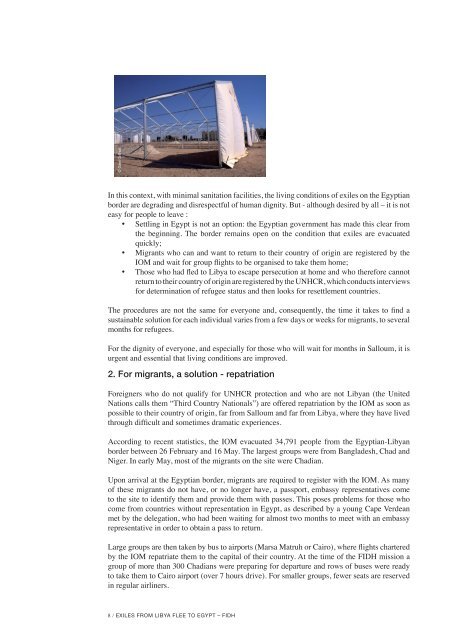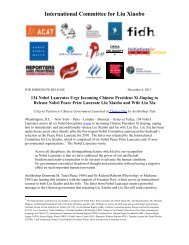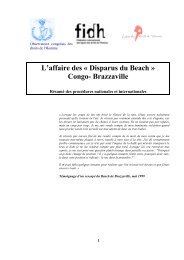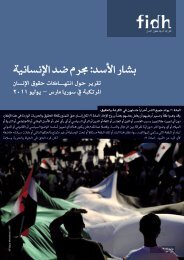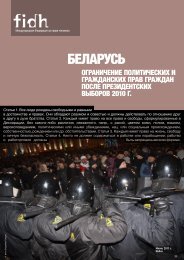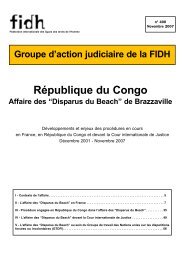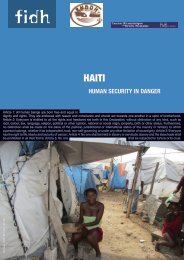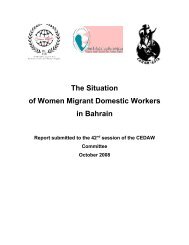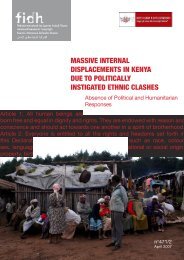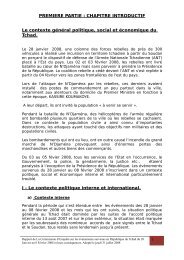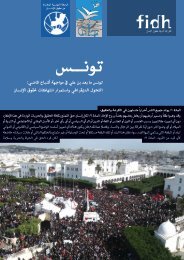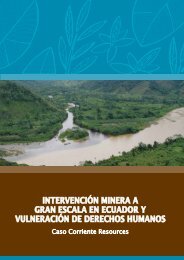Create successful ePaper yourself
Turn your PDF publications into a flip-book with our unique Google optimized e-Paper software.
© Gael GrilhotIn this context, with minimal sanitation facilities, the living conditions of exiles on the <strong>Egypt</strong>ianborder are degrading and disrespectful of human dignity. But - although desired by all – it is noteasy for people <strong>to</strong> leave :• Settling in <strong>Egypt</strong> is not an option: the <strong>Egypt</strong>ian government has made this clear <strong>from</strong>the beginning. The border remains open on the condition that exiles are evacuatedquickly;• Migrants who can and want <strong>to</strong> return <strong>to</strong> their country of origin are registered by theIOM and wait for group flights <strong>to</strong> be organised <strong>to</strong> take them home;• Those who had fled <strong>to</strong> <strong>Libya</strong> <strong>to</strong> escape persecution at home and who therefore cannotreturn <strong>to</strong> their country of origin are registered by the UNHCR, which conducts interviewsfor determination of refugee status and then looks for resettlement countries.The procedures are not the same for everyone and, consequently, the time it takes <strong>to</strong> find asustainable solution for each individual varies <strong>from</strong> a few days or weeks for migrants, <strong>to</strong> severalmonths for refugees.For the dignity of everyone, and especially for those who will wait for months in Salloum, it isurgent and essential that living conditions are improved.2. For migrants, a solution - repatriationForeigners who do not qualify for UNHCR protection and who are not <strong>Libya</strong>n (the UnitedNations calls them “Third Country Nationals”) are offered repatriation by the IOM as soon aspossible <strong>to</strong> their country of origin, far <strong>from</strong> Salloum and far <strong>from</strong> <strong>Libya</strong>, where they have livedthrough difficult and sometimes dramatic experiences.According <strong>to</strong> recent statistics, the IOM evacuated 34,791 people <strong>from</strong> the <strong>Egypt</strong>ian-<strong>Libya</strong>nborder between 26 February and 16 May. The largest groups were <strong>from</strong> Bangladesh, Chad andNiger. In early May, most of the migrants on the site were Chadian.Upon arrival at the <strong>Egypt</strong>ian border, migrants are required <strong>to</strong> register with the IOM. As manyof these migrants do not have, or no longer have, a passport, embassy representatives come<strong>to</strong> the site <strong>to</strong> identify them and provide them with passes. This poses problems for those whocome <strong>from</strong> countries without representation in <strong>Egypt</strong>, as described by a young Cape Verdeanmet by the delegation, who had been waiting for almost two months <strong>to</strong> meet with an embassyrepresentative in order <strong>to</strong> obtain a pass <strong>to</strong> return.Large groups are then taken by bus <strong>to</strong> airports (Marsa Matruh or Cairo), where flights charteredby the IOM repatriate them <strong>to</strong> the capital of their country. At the time of the <strong>FIDH</strong> mission agroup of more than 300 Chadians were preparing for departure and rows of buses were ready<strong>to</strong> take them <strong>to</strong> Cairo airport (over 7 hours drive). For smaller groups, fewer seats are reservedin regular airliners.8 / EXILES FROM LIBYA FLEE TO EGYPT – <strong>FIDH</strong>


